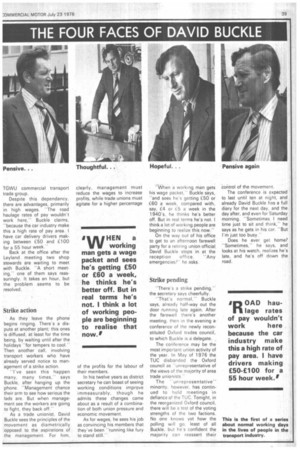THE FOUR FACES OF DAVID BUCKLE
Page 41

If you've noticed an error in this article please click here to report it so we can fix it.
TGWU commercial transport trade group.
Despite this dependancy, there are advantages, primarily in high wages. "The road haulage rates of pay wouldn't work here,'" Buckle claims, "because the car industry make this a high rate of pay area. I have car delivery drivers making between £50 and £100 for a 55 hour week.'" Back at the office after the Leyland meeting two shop stewards are waiting to meet with Buckle. "A short meeting," one of them says reassuringly. It takes an hour, but the problem seems to be resolved.
Strike action
As they leave the phone begins ringing. There's a dispute at another plant; this ones is diffused, at least for the time being, by waiting until after the holidays "for tempers to cool." Then another call, involving transport workers who have already served notice to management of a strike action.
"I've seen this happen many, many times," says Buckle, after hanging up the phone. —Management chance their arm to see how serious the lads are. But when management see the workers are going to fight, they back off."
As a trade unionist, David Buckle sees the principles of the movement as diametrically opposed to the aspirations of the management. For him, clearly, management must reduce the wages to increase profits, while trade unions must agitate for a higher percentage of the profits for the labour of their members.
In his twelve years as district secretary he can boast of seeing working conditions improve immeasurably. though he admits these changes came about as a result of a combination of both union pressure and economic movement.
As for wages, he sees his job as convincing his members that they've been "running like fury to stand still." "When a working man gets his wage packet,'' Buckle says, "and sees he's getting £50 or £60 a week, compared with, say, £4 or £5 a week in the 1940's, he thinks he's better off. But in real terms he's not. I think a lot of working. people are beginning to realize this now."
On the way out of his office to get to an afternoon farewell party for a retiring union official, David Buckle stops in at the reception office. ' ' Any emergencies?" he asks.
Strike pending
"There's a strike pending," the secretary says cheerfully.
'That's normal,'" Buckle says, already half-way out the door running late again. After the farewell there's another meeting, then in the evening a conference of the newly reconstituted Oxford trades council, to which Buckle is a delegate.
The conference may be the most important union activity of the year. In May of 1976 the TUC disbanded the Oxford council as "unrepresentative of the views of the majority of area trade unionists
The —unrepresentative" minority, however, has continued to hold meetings in defiance of the TUC. Tonight, in the reorganized Oxford council, there will be a test of the voting strengths of the two factions. No one knows yet how the polling will go, least of all Buckle, but he's confident the majority can reassert their
control of the movement.
The conference is expected to last until ten at night, and already David Buckle has a full diary for the next day, and the day after, and even for Saturday morning. "Sometimes I need time just to sit and think," he says as he gets in his car. ''But I'm just too busy."
Does he .ever get home? "Sometimes," he says, and looks at his watch, realizes he's late, and he's off down the road
















































































































